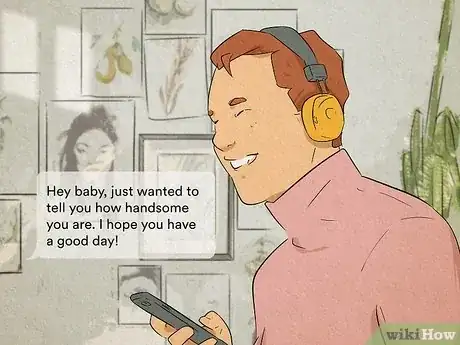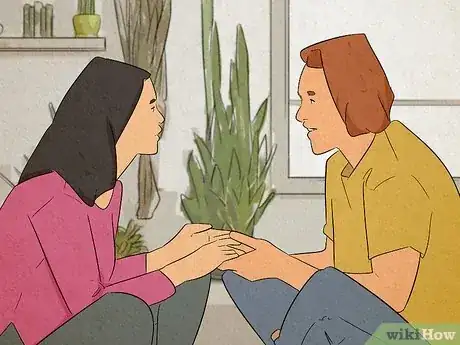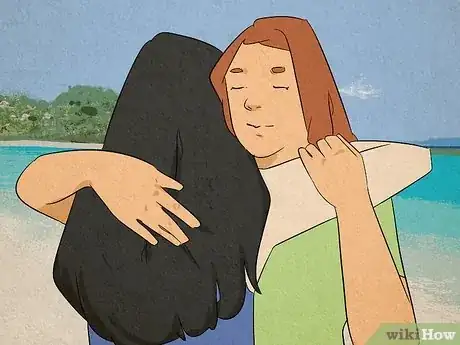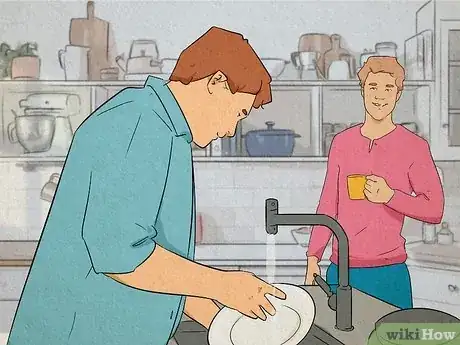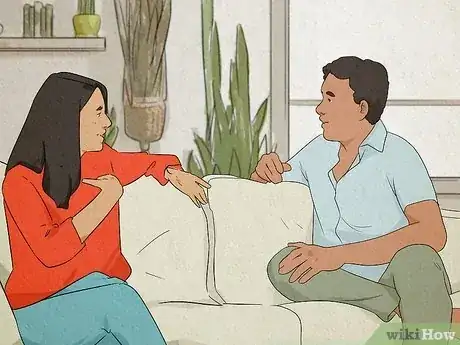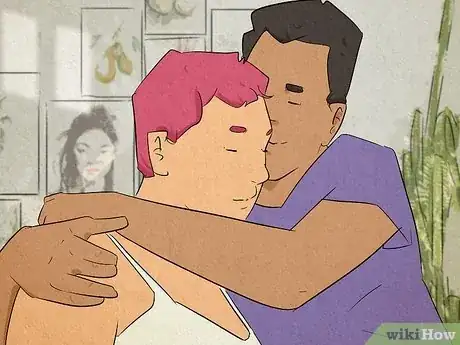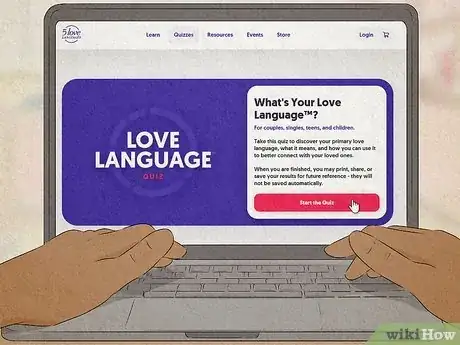This article was written by Sarah Schewitz, PsyD and by wikiHow staff writer, Jessica Gibson. Sarah Schewitz, Psy.D. is a licensed clinical psychologist by the California Board of Psychology with over 10 years of experience. She received her Psy.D. from the Florida Institute of Technology in 2011. She is the founder of Couples Learn, an online psychology practice helping couples and individuals improve and change their patterns in love and relationships.
This article has been viewed 5,315 times.
You're probably familiar with the idea of love languages, but how can you find yours? Since everyone expresses love in different ways, it is helpful to learn how you show affection. Unfortunately, lots of self-help sites or articles assume that you already know your love language. In this comprehensive guide, we'll cover each one and give you examples, so you can find the love language that resonates with you the most.
This article is based on an interview with our licensed clinical psychologist and relationship coach, Sarah Schewitz, founder of Couples Learn. Check out the full interview here.
Steps
What is a love language?
-
A love language is how you show affection and prefer to receive love. The idea of 5 love languages comes from Gary Chapman's famous book. He's studied the way people typically express love and divided it into 5 types or languages. Here are the standard 5 love languages, along with a couple other lesser-known ones:
- Words of affirmation
- Quality time
- Physical touch
- Acts of service
- Receiving gifts
- Intellectual
- Emotional
Words of Affirmation
-
You thrive when someone says kind words or gives you a compliment. You need to hear your loved ones tell you how much they care, preferably every day. You find it really touching to hear them say, "I don't know what I'd do without you," or, "I love you so much." Is your love language words of affirmation? Think about how many of these statements you identify with:
- It means a lot to me when my partner tells me how nice I look.
- I like it when someone I love tells me what they like about me.
- It’s more meaningful to me to get a loving note, message, or email for no reason from my loved one.
- I need to be told that I’m special or important.
- I love the feeling I get when my partner tells me they appreciate me.
Quality Time
-
You feel loved when someone gives you their full undivided attention. You love it when a loved one plans a date and then listens to you when you spend time together. You feel valued if they've thought out all the details, so you can just enjoy each other's company. Is your love language quality time? See how many of these statements resonate with you:
- I feel whole when I’m around a loved one and we don’t even have to say anything.
- I enjoy taking long trips just with someone I love.
- It’s important to me that I can spend alone time just my partner.
- It’s meaningful to me if someone I love cancels their plans to make time for me.
- It's really important that my partner puts away their phone when they're talking with me.
Physical Touch
-
You experience love through a physical connection. You'd probably describe yourself as a touchy-feely person. You like getting hugs or having someone pat your shoulder reassuringly. Still not sure if physical touch is your love language? Check out how many of these statements you identify with:
- It’s meaningful to me when I hug someone I love.
- I feel loved when my partner kisses me for no special reason.
- I love it when my partner rubs my back.
- I feel whole when someone I love holds my hand in public.
- I feel relaxed and supported when I’m getting a massage or caress.
Acts of Service
-
You think that actions speak louder than words. Imagine you threw away an important document and a loved one fished it out of the trash for you. You probably found that super meaningful! When they do helpful things that make your life easier, you see that as love. If you think your love language is acts of service, see how many of these statements resonate with you:
- I love it when my partner lets me pick the movie even though they dislike it.
- It’s important that a loved one helps me without me asking.
- I feel cared for when someone I love does a chore I dislike doing.
- It’s nice when my partner runs errands for me if I feel under the weather.
- I feel supported when someone I love helps me on a big project I need to finish.
Receiving Gifts
-
You see gifts as symbols of love and thoughtfulness. If this is your love language, you find it really touching when someone you love brings you flowers. You love a surprise gift because it means your loved one was thinking about you. These don't have to be huge gifts—you know it's the thought that counts! Is receiving gifts your love language? Think about how many of these statements you identify with:
- It's important to me that I get a gift that's thoughtful.
- I feel loved when my partner gives me a gift on my birthday.
- Getting a surprise coffee or treat makes me feel cared for.
- Visible symbols of love like cards, jewelry, or flowers are very important to me.
- I feel loved when my partner gives me a gift to remember our anniversary.
Intellectual
-
You experience love as a mental connection. If intellectual love is your love language, you feel fulfilled when your partner asks and respects your opinion. You feel loved when they're impressed with your intelligence or with some smart remark you made. If you think your love language is intellectual, check how many of these statements resonate with you:[1] X Research source
- I feel loved when my partner asks for my advice.
- I feel valued when people ask me to share my opinions.
- I enjoy it when someone I love talks with me about things that matter.
- I love it when my partner's excited to talk with me about something.
- I enjoy thinking up topics of conversation before I go out.
Emotional
-
You equate love with always being there for someone through deep emotional support. If your love language is based on emotional connection, you feel comforted knowing you can turn to your partner or a loved one for help. Life is tough—knowing that people who love you are there for you no matter what is critically important.[2] X Research source If you think your love language is emotional, check out how many of these statements you agree with:
- I have no problem reaching out to a friend if I'm struggling.
- I check in with my friends and family to see how I can help them.
- I make a point of calling loved ones when they seem down.
- I feel valued when someone wants to talk to me about their problems.
- I stick with my partner through the good times as well as the tough times.
Take a love language quiz if you’re not sure.
-
Most people have a mix of love languages and a quiz can help you identify them. If you head to the official 5 Love Languages website and take the quiz, you'll see what percentage of each love language you experience. For instance, you might take the quiz and find out that your love language is 30% words of affirmation, 23% receiving gifts, 20% physical touch, 17% quality time, and 10% acts of service.[3] X Research source
- Before you begin, the quiz asks you to select your age demographic and relationship status, so it can tailor questions to you.
You Might Also Like





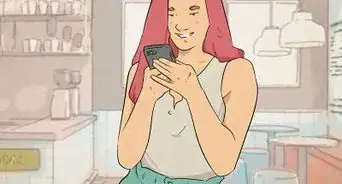 11 Tips to Get His Attention Back
11 Tips to Get His Attention Back





 Capricorn Compatibility: What Signs Are Least Compatible with Capricorn?
Capricorn Compatibility: What Signs Are Least Compatible with Capricorn?
 The Honeymoon Phase: What It Is & How Long It Lasts
The Honeymoon Phase: What It Is & How Long It Lasts

References
About This Article


